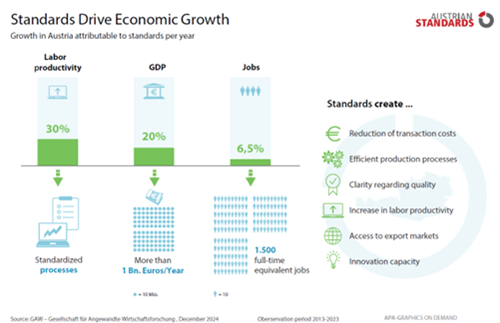A new macroeconomic study commissioned by Austrian Standards and conducted by the Austrian Institute for Applied Economic Research (GAW) highlights the measurable contribution of standardization to Austria’s economic performance over the past decade (2013–2023).
These are the findings:
- Standards contributed to 20% of Austria’s real GDP growth, equivalent to over €1 billion annually.
- Standardization accounted for 6.5% of annual employment growth, equaling 1,500 full-time jobs.
- Around 30% of the increase in labour productivity can be attributed to the use of standards.

The regression analysis carried out over a ten-year analysis period (2013–2023) examines the measurable effects of standardization on key indicators such as employment, labour productivity and, above all, GDP as the most prominent indicator. The results confirm the overall economic significance of standardization in Austria and also correspond with the results of studies from other European countries.
This study shows that standards are a key success factor for the Austrian economy – especially for the 579,500 small and medium-sized enterprises (SMEs), which form the backbone of the market-oriented corporate landscape with a share of 99.7 percent.
“Standards function as a common language. They facilitate the integration of especially small and medium-sized enterprises into global value chains,” said Valerie Höllinger, CEO of Austrian Standards.




